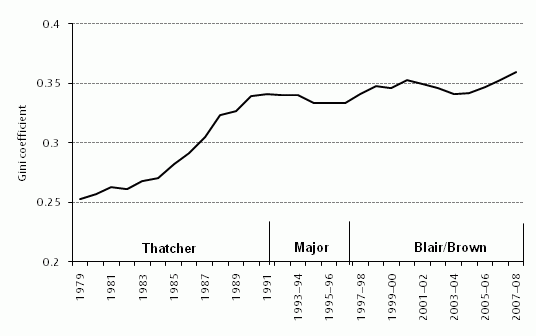One of David Cameron's key themes in his speech to the Conservative Party conference was that Labour has "made the poorest poorer", "left youth unemployment higher" and "made inequality greater". How fair are these accusations?
We reported earlier this year that, until 2007-08, the latest year for which we have data, the third term of this Government has seen a rise in income inequality, and a fall in the income of the poorest fifth of the population, justifying Cameron's claims. But Labour's record over their entire term in office is slightly different. Cameron's claim that income inequality has risen is still true over this longer period: income inequality was slightly higher in 2007-08 than in 1996-97. However, since 1996-97, there has been positive income growth, after allowing for inflation, at almost every part of the income distribution except amongst the poorest 3 per cent of the population. It is, therefore, technically true that those with the very lowest incomes now have lower incomes than in 1996-97, but we have argued that difficulties in recording income amongst some groups means that those with the lowest reported incomes can often have very high living standards . So the fall in income for those with the very lowest recorded incomes is probably not, therefore, a good guide to what has actually happened to the poorest in society.
How do overall trends in poverty and inequality compare with those observed under the last period of Conservative government between 1979 and 1997? As the figure below shows, income inequality rose substantially during the 1980s, dwarfing the small increase under Labour to date. And the incomes of the poorest 2 per cent of the population were lower in 1996-97 than they were in 1979, similar to what has happened under Labour. As can be seen in our annual report on poverty and inequality and our on-line inequality data resource, there was also a large rise in relative poverty during the 1980s, which compares with a small fall under Labour to date (although relative poverty amongst working-age adults without children has risen since 1997-98). Furthermore, we have found that direct tax and benefit changes made by the previous Conservative governments acted to increase income inequality, whereas those made by since 1997-98 have benefitted the poor by more than the rich.
Turning to youth unemployment, Cameron is correct to point out that youth unemployment was higher over this summer than any period since 1992, the start of official data. We have argued that the rise in youth unemployment during this recession is no different from what happened during the previous two. However, the level of unemployment is highly affected by the state of the economy, and the unemployment rate for 18 - 24 year olds was no higher before the current recession than when Labour came to power.
So it is fair to say that youth unemployment and income inequality have risen under Labour, and that, on a very narrow, and potentially uninformative, measure, the incomes of households with the lowest incomes are now lower than they were in 1996-97. But, although the performance of the last Conservative government is not necessarily a guide to a potential future administration, the record on youth unemployment was no better, and on poverty and inequality considerably worse, in the Thatcher and Major administrations than under Blair and Brown.
The Gini coefficient, 1979 to 2007-08 (GB)

Note: The Gini coefficient has been calculated using incomes before housing costs have been deducted. Source: Authors' calculations using Family Expenditure Survey and Family Resources Survey, various years. Taken from Figure 3.7 of http://www.ifs.org.uk/comms/c109.pdf.













